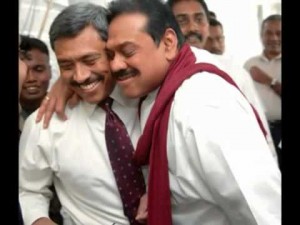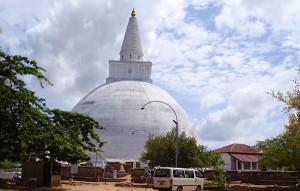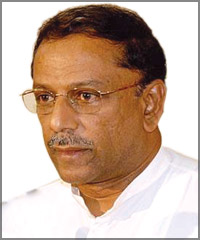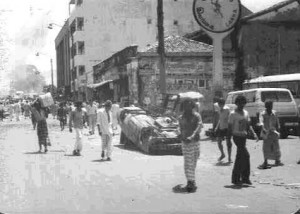Rejection of FOIA -just another nail in the coffin of freedom in Sri Lanka
What started, with the easy passage of the draconian 18th amendment to the constitution of Sri Lanka, seems to continue without any break towards certain death of democracy and freedom. The right to information is acknowledged as a universal right of each and every human being. Of all SAARC countries, only Bhutan and Sri Lanka do not have a Right to Information Act in place. Even
Pakistan which has not had a democratic system of government but for a few short years under the Bhuttos, father and daughter, and Bangladesh that came into existence as recently as 1972 have Right to Information Acts. With all its infamous corruption, nepotism and scandal, India has an exemplary Right to Information Act, thereby establishing her credentials in transparency and accountability. Even Nepal which was a monarchy until recently can boast about a Right to Information Act.

Presidential sibling and Defence Secretary Gotabaya Rajapakse gets a hug of relief from big brother President Mahinda Rajapakse minutes after Gotabaya survived a suicide attack on his motorcade in December 2006
Where does this leave Sri Lanka? The proud country of “the land, the race and the faith” (as most prominently quoted in Jeyaratnam Wilson’s “Breakup of Sri Lanka”) has chosen to suppress the very passage of the bill that was introduced in Parliament on Tuesday, June 21, 2011 by a private member of Parliament. The sad saga continues.
This nation that very proudly claims the glories of King Dutugemunu’s war victories and his subsequent magnanimity by decreeing to all citizenry to pay respects to fallen King Elara whenever they pass through his tomb, this nation that claims ownership of the purest form of Theravada Buddhism, this nation that boasts of magnificent stupas and dagobas that stand tall penetrating the clear blue skies, representing the very essence of Buddha’s teachings of Metta (compassion), Karuna (kindness), Muditha (love) and Upekkha (indifference), this nation of ours that keeps pontificating about the practice of universal tolerance and charity and which sometimes thunders to the empty skies clamoring for equality in the community of nations, today finds itself dumbfounded, but for a few government propaganda lackeys, when struck by allegations of atrocious crimes committed against a segment of its own people. “The land, the race and the faith” trio has landed the country into a corner from which it seems extremely hard to come out.
Command responsibility
While the pictures that came out of the so-called “humanitarian operation with zero casualties” claimed the good name of “The land, the race and the faith” as the biggest casualty. Imprudent statecraft, idle threats, grandiose personality cults – all these paved the way for a very sorry story of a fast-vanishing phenomenon called transparency and accountability on the part of the rulers who were democratically elected. The anguish of those parents whose sons were sacrificed at the altar of this so called humanitarian operation might inevitably fade away with the passage of time. Nevertheless, the living soldiers who are responsible for the commission of these crimes, if in fact they were committed, will be kept away from the arms of the law for their exposure would ultimately lead to those who gave the orders.
Shrieks of denial
In such a context, the government’s resistance to a Right to Information Act is of critical importance. It is crucial because the very
existence of such a law would compel the Government and its officers to release whatever information that is requested by the general public, subject of course to the constraints imposed by the Act. The shameless way the introduction of this Bill was stopped by the Government Parliamentary Group is unparalleled in our parliamentary history. The Leader of the House, Dinesh Gunawardena yelling at the top of his shrieky voice with the rest of his “gang” adding to the cacophony of voices reminded one of an ill-trained orchestra playing to the tune of a third class conductor. The venom and anger with which the Government greeted the introduction of the Bill overwhelmed both the spirit and seriousness of the substance of the Bill. The intensity and perseverance that should be a hallmark of a seasoned parliamentarian was lacking in the UNP contingent. What is even more appalling is the total absence of follow-up action. The misfortune is that as much as the people deserve the governments they get, they deserve their opposition too.
Orgy of violence
What is really wrong with Sri Lanka? It is not a rhetorical question. Is it in the DNA of the average Sri Lankan to passively accept autocratic rule and go after only the unarmed? During ’87-89’ insurrection, the JVP tortured, maimed and killed unarmed civilians. But when the Sri Lankan security forces closed in on them and with the capture of the first and second-tier leaders, the rest of the leadership caved in quite ignominiously, thereby displaying their cowardice more than anything else. This was the case in the ’83 ethnic riots too. When Pirapaharan and his LTTE
cadre of six or seven men ambushed thirteen armed Sri Lankan soldiers in the thick of the theatre of war in Jaffna, our ‘Sinhalese heroes’ in Colombo and elsewhere went after innocent Tamils and engaged in an orgy of murder, rape and looting which caused a point of no return not only for Tamil militants but also for non-militant Tamil civilians in the country. Some of these despicable “vengeance-marches” were led by well-known Buddhist monks. So much for the compassion and love preached by the Great Teacher. That turned the international opinion against Sinhalese majority and branded them as barbarians, resulting in Sri Lankans being subjected to ethnic-profiling especially in western countries. It took more than a couple of decades to erase that stigma form many minds.
Defensive mode
The Government’s quagmire does not relate to the substance or the authenticity of the Channel 4 video. Firstly, the imprudent and flawed stance that it took while the war was going on that there were “zero casualties” and calling a bloody war a “humanitarian operation” and secondly the incarceration of General Fonseka who was primarily responsible for directing the battle operations were the duel factors that inevitably led to its grossly foolish position. That coupled with sheer incompetence on the part of the Ministry of External Affairs had a compounding effect on igniting the world opinion that was being created just at this time. That placed the Sri Lankan regime led by the Rajapaksas in a defensive mode; they were too confused to compete for a spot in the international arena of media blitz and more than one voice was heard in the various international debates – G. L. Peiris was sent to India, Mahinda Samarasinghe headed to Geneva, Sarath Amunugama somewhere else and for local consumption, there were the ever so vocal Sinhala chauvinists such as Champaka Ranawaka and Wimal Weerawansa, not to mention the most reckless and unwise “quotable quotes” by Secretary of Defense and Presidential sibling – Gotabaya Rajapakse.
All politics is local. After President Premadasa, Mahinda is the only leader who played everything to the local populace. During an election time this seems a very lucrative tactic to win votes, but in the context of the current unprecedented international scene this very tactic can turn into a Damocles’ sword.
Prevention of the Right to Information Act can be marked as significant a misstep as the passage of the 18th Amendment of the Constitution. It is another nail on the coffin of freedom. Dictators in history always thought that their power would last for ever; some who grabbed power by way of coups and military means as well as those who were first voted into power and then turned screws on the very people who gave them that power never paused to think that this power would not last for ever. Hitler’s much heralded ‘1000-year Reich’ lasted only 12. There is a reason for it. When in power, a wall is built around them to keep the people out of it. Those outside do not see what’s going on inside and vice versa. Into this morass worms in the court jesters who for their own parochial ends see nothing but the strength and sweetness of their “lokkas”. This is the universal phenomenon of power. The present regime enjoys a lot of it. It is precisely in that context that a constitutional piece such as the Right to Information Act could have played a crucial role in checkmating their inevitable march into the valley of death of freedom and democracy.
The present regime has many shortcomings, lack of transparency and accountability, corruption, nepotism etc. But incompetence will be the cause of their ultimate demise.




June 30, 2011 at 12:51 am
I must say outstanding, comment “The land, the race and the faith” trio has landed the country into a corner from which it seems extremely hard to come out.
So very true.
June 30, 2011 at 12:16 am
Out standing article, well done